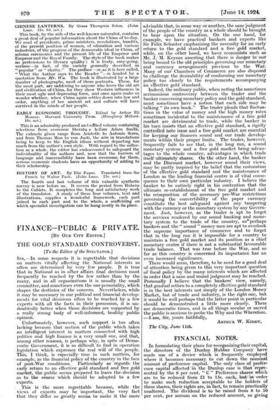FINANCE-PUBLIC & PRIVATE.
[BY OUR CITY EDITOR.]
THE GOLD STANDARD CONTROVERSY.
[To the Editor of the SPECTATOR.] SIR,—In some respects it is regrettable that decisions on matters vitally affecting the National interests so, often are determined by very few people. It is true that in National as in Oiler affairs final decisions must frequently be reached by the few rather than by the many, and in all organizations it is usually the small committee, and sometimes even the one personality, which shapes the destinies of the concern. Nevertheless, while it may be necessary in our political and financial develop- ments for vital decisions often to be reached by a few experts with all the facts in their possession, it is un- doubtedly better when those decisions are supported by a really strong body of well-informed, healthy public . opinion.
Unfortunately, however, such support is too qften lacking because that section of the public which takes an intelligent interest in matters connected with high politics and high finance is a very small one, and that, among other reasons, is perhaps why, in spite of Demo- cratic Government, it is so difficult to find in operation legislation which expresses the real will of the people. This, I think, is especially true in such matters, for example, as the financial policy of the country in the face of post-War conditions. Particularly as regards the early return to an effective- gold standard and free gold market, the public seems prepared to leave the zdecision as to the course which should be adopted to a few experts.
, This is the more regrettable because, while the views of experts may be important, the very fact that they differ so greatly seems to make it the more advisable that, in some way or another, the sane judgment of the people of the country as a whole should be brought to bear upon the situation. On the one hand, for example we have practical bankers and experts like Sir Felix Schuster emphasizing the necessity for an early- return to the gold standard and a free gold market, while, on the other hand, we have economists such as Mr. J. M. Keynes asserting that there is danger-in- our being bound to the old principles governing our monetary and currency arrangements previous to the War: Many of our Chambers of Commerce are also dispoied to challenge the desirability- of conforming our monetary' policy too closely to the requirements accompanying an effective gold standard. Indeed, the ordinary public, when noting the sometimes acrimonious controversy between the trader and the banker concerning monetary policy and the gold standard, must sometimes have a notion that each side may be talking " its own- book." The trader pleads that 'fluctua- tions in the value of money and the high money rates sometimes incidental to the maintenance of a free gold market are detrimental to trade, while the banker in his turn insists that an effective gold standard, a rigidly
controlled note issue and a free gold market are essential
for keeping our finances sound and our trade develop- ments within their proper limits. The trader, however, frequently fails to see that, in the long run, a sound monetary system and a free gold market bring advan- tages to the whole country, advantages in which trade itself -ultimately-shares: On the other hand, the banker and the Discount market, however sound their views, may be partly inspired by the belief that the restoration of the effective gold standard and the maintenance of London as the leading financial centre is of vital conse- qnence to their own particular industry. I believe the banker to be entirely right in his contention that the ultimate re-establishment of the free gold market and the reimposition of the necessary pre-War restrictions governing the convertibility of the paper currency constitute the best safeguard against any tampering with the currency or the monetary system by any Govern- ment. Just, however, as the trader is apt to forget the services rendered by our sound banking and mone- tary system to the trade of the country, se-perhaps bankers and the " sound "money men are apt to overlook the supreme importance of commerce and to forget that in the long run it is impossible for a country to maintain a free -gold market and its position as a chief monetary centre if there is not a substantial favourable trade balance. That -was true before the War, and so far as this-- country is concerned its importance has an even increased significance.
There would seem, thereforel to be need for a good deal of attention being given to this very important question of fiscal policy by the many, interests which are affected in order that a sane and sound judgment may be reached. Personally I believe that the bankers' view, namely, that gradual retfun to a completely effective gold standard is in the best interests not simply of the London Money Market, but of trade and industry, is the right one, but it would be well perhaps that the latter point in particular should be demonstrated a little more clearly. These are democratic times, and in all things secular or sacred the public is anxious to probe the Why and the Wherefore. am, Sir, yours faithfully,
ARTHUR W. KIDDY.
The City, June nth.










































 Previous page
Previous page